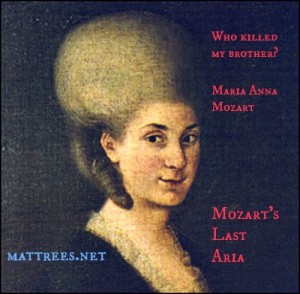In a Mozart thriller, the music is naturally one of the most important elements. You might even say it’s one of the leading characters. Certainly it’s the focal point of Nannerl Mozart’s life. Here are links to some of Wolfgang’s pieces I used in the book
In the Prologue, young Wolfgang hears his Aunt Nannerl singing an aria called “Vedrai carino” (“You will see, my dear”). In the opera Don Giovanni, the aria is sung by a young woman named Zerlina, consoling her lover.
The variations on a French nursery rhyme played by Nannerl’s son in Chapter One are “Ah, vous dirai-je.” Perhaps you know them as “Twinkle Twinkle, Little Star.” In the same chapter, Nannerl plays the disturbing, frenetic opening movement of the sonata for piano in A minor, which Wolfgang wrote just after his mother’s death.
Wolfgang’s friend Anton Stadler was a master of the clarinet. He also invented a longer clarinet with some extra low notes, the bass clarinet. The soloist in this concerto in A by Wolfgang is using such a clarinet.
At the concert in Chapter 8, Constanze sings: “Ach, ich liebte” (“Ah, I was in love”), an aria from the opera Die Entführung aus dem Serail (The Abduction from the Seraglio), which Wolfgang wrote for a character he called “Konstanze.” He was courting Constanze at the time he wrote it. The orchestra then plays the Symphony number 41, which is known as the “Jupiter” symphony. Constanze’s sister sings “Der Hölle Rache” (“Hell’s revenge”), an aria from the opera The Magic Flute and Nannerl ends the concert with the beautiful piano concerto in C.
In Chapter 22, Nannerl sings for Baron van Swieten. The aria for soprano “Vorrei spiegarvi” (“I wish to explain to you”). It’s a tender love song by a woman who cannot be with her true love.
When he died, Wolfgang was writing a Requiem, or funeral mass. It includes some of the most powerful music ever composed.
When she experiences love, Nannerl thinks of course of Wolfgang’s music. In Chapter 31, it’s Un’aura amorosa (“A loving breath”), an aria from Cosí Fan Tutte. Here it is sung by Pavarotti for all you Three Tenors fans.
One of the climactic scenes of Mozart’s Last Aria is built around the finale of Wolfgang’s great opera Don Giovanni. Here it’s performed with my fellow Welshman Bryn Terfel as the Don, in the scene which sees him dragged down to Hell.

 Mozart’s Vienna: the locations of my Mozart novel
Mozart’s Vienna: the locations of my Mozart novel